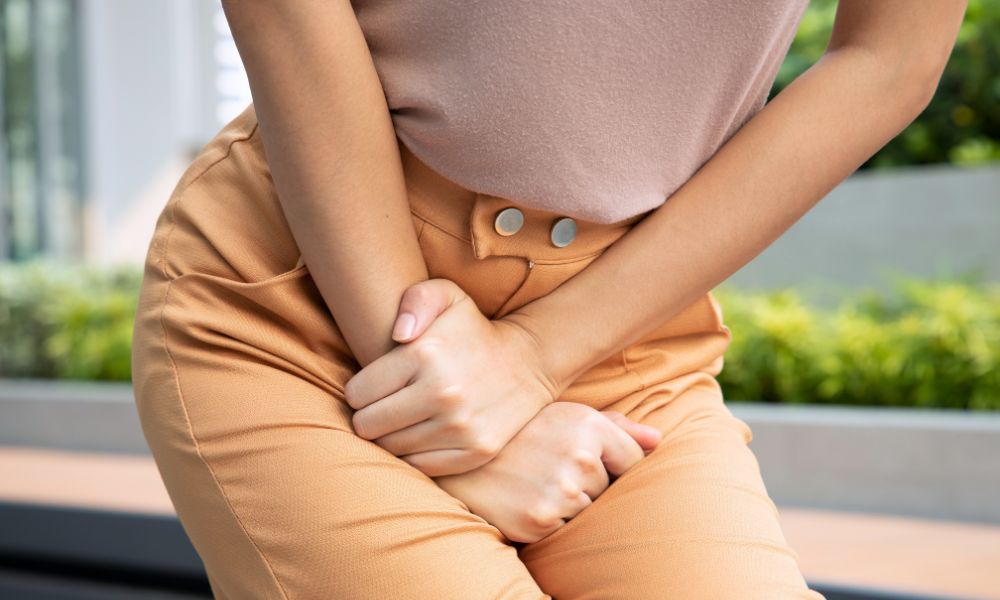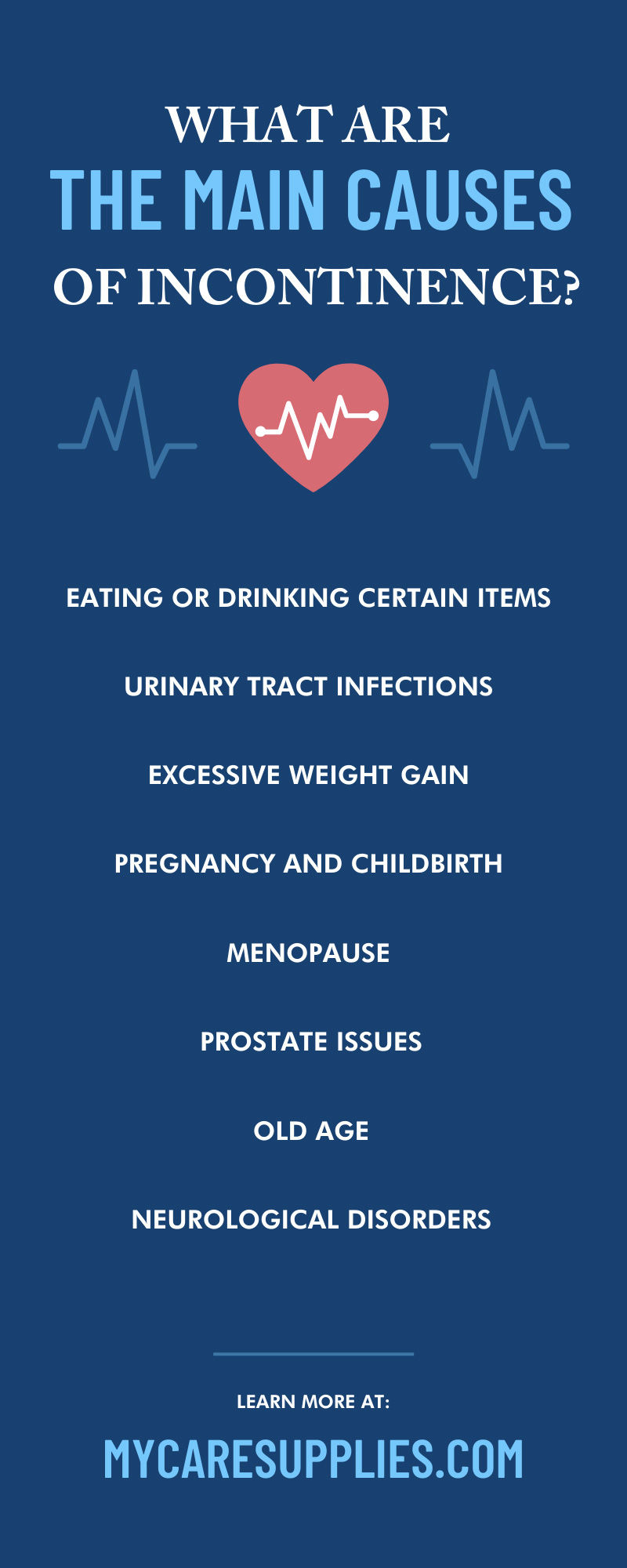What Are the Main Causes of Incontinence?
Posted by Jeanne Lowry on Apr 13th 2023

There are many medical conditions out there that people tend to fear. While most of them are the more obvious life-threatening issues, one stands out as a surprise due to how common it is: urinary incontinence. Being unable to control your bladder as a grown adult can sometimes feel a little embarrassing, so it’s reasonable that some people may worry about this condition.
While incontinence isn’t something you should feel ashamed of since it can happen to anyone, it is a problem you can deal with and sometimes revert over time. However, in order to understand how to do that, you first need to know the main causes of incontinence. Once you do, you can better address the issue and fix it.
The Causes
For those who don’t know, there are many different forms of incontinence. Some of them are more temporary, while others can be harder to address. Either way, the causes behind them can vary quite a bit, so we’ll cover them all in this section.
Eating or Drinking Certain Items
If you have incontinence-like symptoms that come and go, some of the things you eat or drink might be the cause of them. While these substances don’t affect everyone this way, they might be the thing that makes you have trouble controlling your bladder.
Some of the more common causes include caffeine, citrus, alcohol, and spicy foods. If you notice your symptoms becoming worse after ingesting these items, they’re likely the main cause.
Urinary Tract Infections
Certain foods and drinks aren’t the only temporary cause of incontinence, though. Urinary tract infections (UTIs) can also make a person incontinent. The infection can irritate your bladder, causing it to lose control of your urine in some instances. After you take the necessary medication to clear up a UTI, symptoms should subside.
Excessive Weight Gain
Moving into some of the longer-lasting issues that can cause incontinence, we have excessive weight gain. While not all people who exceed a healthy weight will have incontinence symptoms, some will. The excess weight might put extra pressure on a person’s bladder, causing them to need to go more often. Fortunately, working with a medical professional can help someone discover options for resolving this issue.
Pregnancy and Childbirth
Another issue that can cause long-term incontinence is pregnancy. Pregnancy is another bodily change that can apply extra pressure to a woman’s bladder, forcing them to need to go to the bathroom more often. However, hormonal changes can also have an effect.
While childbirth can clear up these issues, in some cases, it can worsen your incontinence. The childbirth process can weaken your bladder and urethra muscles and potentially damage some of the nerves in that area. While these issues can be harder to fix, they’re certainly not impossible to address.
Menopause
Unfortunately, women are more likely than men to develop incontinence, as the hormonal imbalances of menopause can also cause incontinence.
During menopause, women produce less estrogen, which helps keep the bladder and urethra lining healthy. When the amount of estrogen in your system decreases, it could deteriorate these two crucial urinary tract components.
Prostate Issues
However, men aren’t completely out of the woods when it comes to incontinence issues. The prostate can also be a source of urinary troubles. If you have an enlarged prostate, it might put excess pressure on your urethra and the neck of the bladder, making it more difficult for your bladder to hold urine. Prostate cancer could also lead to some incontinence-based issues, although these are usually related to the treatments rather than the cancer itself.
Old Age
The great equalizer when it comes to gender, though, is old age. Many people believe that incontinence is an issue that only happens to older generations, but as we’ve seen so far, that’s certainly not the case. However, that doesn’t mean seniors aren’t more prone to this type of issue. Due to their aging muscles and organs, in some cases, the bladder just can’t hold back urine like it used to.
Neurological Disorders
We’d also like to note that some neurological disorders could cause incontinence issues in some people. Conditions such as Parkison’s disease, multiple sclerosis, and even a stroke could interfere with the nerves in your urinary tract, causing you to lose control of your bladder. This occurrence isn’t overly common, though.
The Solutions
Luckily, there are actions you can take when facing incontinence. Knowing the main causes of incontinence is only half the battle. Now you need to know what you can do about it to fix the issue. Here are some suggestions we have for you in that regard.
Cutting Back on Foods and Drinks
One of the first things anyone with incontinence should do is cut back on certain foods and drinks. Even if these aren’t the source of your bladder control issues, ingesting them can make your symptoms worse.
If your incontinence stems from weight, switching to a different diet may also help you see improvements. Either way, watching what you eat will help your incontinence symptoms subside.
Bladder Training
Next up, we have bladder training. While it will initially seem difficult, it is possible to slowly train your bladder to go less often. Make a bathroom schedule for yourself and try your best to stick to it.
Once you start consistently hitting your goals, extend the length between bathroom breaks. While this method mostly helps your break through mental barriers associated with incontinence, it can also help build up your pelvic floor.
Kegel Exercises
If you want to work on your pelvic floor muscles more directly, look into Kegel exercises. Normal workout routines often overlook this muscle group, so you’ll need to find exercises that focus specifically on this muscle group. If successful, this method can help reverse a lot of incontinence-based issues.
Surgical Procedures
However, sometimes it doesn’t matter what lifestyle changes you make; you just can’t manage your incontinence on your own. When that’s the case, it may be time to talk to your doctor about your surgical options. This option is best if your incontinence stems from problems in your nervous system. However, a urostomy surgery can navigate any bladder issue by bypassing it completely.
No matter the cause of your incontinence, you will need a reliable source of adult incontinence supplies to help you stay comfortable. My Care Supplies is here to help. We have hundreds of these items for sale, so you’ll be able to easily find whatever you need to handle your ostomy.


